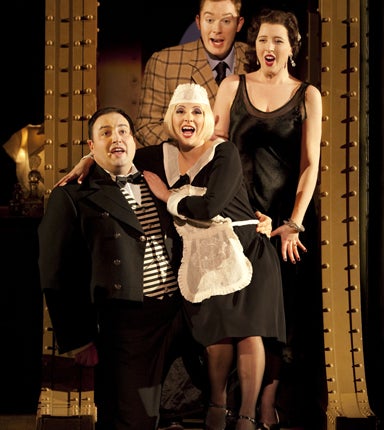The Abduction from the Seraglio, Millennium Centre, Cardiff<br/>The Gamblers, Royal Festival Hall, London
Welsh National Opera gets up a good head of steam, and fragments of Gogol are a tantalisingly brief encounter

Your support helps us to tell the story
From reproductive rights to climate change to Big Tech, The Independent is on the ground when the story is developing. Whether it's investigating the financials of Elon Musk's pro-Trump PAC or producing our latest documentary, 'The A Word', which shines a light on the American women fighting for reproductive rights, we know how important it is to parse out the facts from the messaging.
At such a critical moment in US history, we need reporters on the ground. Your donation allows us to keep sending journalists to speak to both sides of the story.
The Independent is trusted by Americans across the entire political spectrum. And unlike many other quality news outlets, we choose not to lock Americans out of our reporting and analysis with paywalls. We believe quality journalism should be available to everyone, paid for by those who can afford it.
Your support makes all the difference.First-night jitters derailed The Abduction from the Seraglio. James Robinson's 13-year-old production, which is set on the Simplon-Orient Express, had already made its way across America before arriving in Cardiff.
Sleepy patrons roused by the first fizz of Mozart's Janissary cymbals might be forgiven for imagining they'd woken up in front of a day-time repeat of Jeeves and Wooster or Poirot. Yet after a week in the sidings, the second performance of Welsh National Opera's demi-semi-serious take on Mozart's singspiel had vivacity and elegance enough to compensate for any bumps and creaks.
Encased in gleaming wood-panelling, designer Allen Moyer's lavishly upholstered saloon car and well-stocked butler's pantry convey the cocooned opulence of 1920s travel. Robinson's choice of era is smart. With tabloids thrilling to stories of white slavery, Irving Berlin's "Lock Me in Your Harem and Throw Away the Key" a speakeasy standard, and Guerlain kissing the necks of his customers with Shalimar, Orientalism was all the rage: mysterious, fantastic, dangerous. After recent attempts to rewrite Mozart's rescue comedy as a post-9/11 polemic, it's a relief to see a production that embraces innocence: from the tender fidelity of Konstanze (Lisette Oropesa), the hapless heroism of Belmonte (Robin Tritschler), the saucy modernity of Blonde (Claire Ormshaw), the bemusement of Osmin (Petros Magoulas) and the wise-cracking, Turk-baiting loyalty of Pedrillo (Wynne Evans), to the energy, exoticism and trembling, first-love seriousness of the score.
So let's pass over the moment when one actor has to give a helping hand to the person who is supposed to be tying him up. For all the fun with ladders made of table linen, "wine" mixed in a cocktail shaker, japes at the ironing board (why are operatic servants so bad at folding napkins?) and comedy burqas, it is the moments of musical gravitas that resonate. Rinaldo Alessandrini's pitch-perfect reading of the score incorporates all the zip and piquant articulation you would expect from period performance while clearing space for the unhurried lyricism of Belmonte and Konstanze's laments and some enchanting obbligato solos from the orchestra.
Tritschler's naturally high, understated Irish tenor is sinuous and sweet, while Oropesa's ardent, dewy soprano makes "Traurigkeit ward mir zum Lose" the high point of the work and delivers "Marten aller Arten" with ease while being showered with furs, silks, jewels and shoes (shoes!) by Simon Thorpe's dry sophisticate of a Pasha. The mutual cultural bafflement between Blonde and Osmin is deftly handled, while Evans's German ad libbing and wry, stylish reading of "In Mohrenland gefangen war" (with his master's ukulele) is simply faultless. Yes, this Seraglio is a little too much like watching television in the afternoon. But the soundtrack is sublime.
So, from ukuleles to balalaikas, bedbugs, smoked fish, fleas and a 45-minute fragment of The Gamblers. Conducted by Vladimir Jurowski and cunningly semi-staged by Irina Brown, Wednesday's performance by the London Philharmonic Orchestra at the Royal Festival Hall made one weep that Shostakovich gave up on his setting of Gogol's comedy in 1942. Intractable problems with the quantity of dialogue was one reason, a lack of variety from the all-male cast another. Yet what remains is tight, taut and peppery: a smoky series of plump doynas, hectoring fugues for the card sharps (Sergei Leiferkus, Sergey Aleksashkin and Viacheslav Voynarovskiy), boasts between the servants (Vladimir Ognev and Mikhail Petrenko), a silky serenade to marked cards (Mikhail Urusov), a tongue-in-cheek romance for violin (guest leader Alex Vilinzon) and a drowsy lament for basso profundo (Ognev), bass balalaika and tuba. The place, plot and personalities are set up. Then it stops.
Pairing The Gamblers with the Suite from The Nose made sense. The opening toccata for brass introduces a rude exchange ("Your hands stink!"/ "What of?"/"I don't know, they just do!") delivered with pungent aplomb by Leiferkus and Urusov. Under Jurowski's close, cool beat, the xylophone skittered cinematically, the harps cast their blurred, codeine glow, the percussion interlude was a grinning carnival. In the middle of this Gogol sandwich was the First Symphony, at its zany, cartoon heart that sudden, dismayed song for solo cello (Kristine Blaumane). Fresh from Richard Jones's production of Prokofiev's The Gambler, I wondered what he'd do with Shostakovich's fragment. Could Glyndebourne be persuaded to run a double-bill of fragments? It's a tantalising thought.
'The Abduction from the Seraglio' (01492 872000) Venue Cymru, Llandudno, 9 Mar, then touring
Next Week:
Karita Mattila takes the role of Emilie du Châtelet, blue-stocking, gambler and lover of Voltaire, in Kaija Saariaho's Emilie. Anna Picard attends the premiere in Lyon
Join our commenting forum
Join thought-provoking conversations, follow other Independent readers and see their replies
Comments